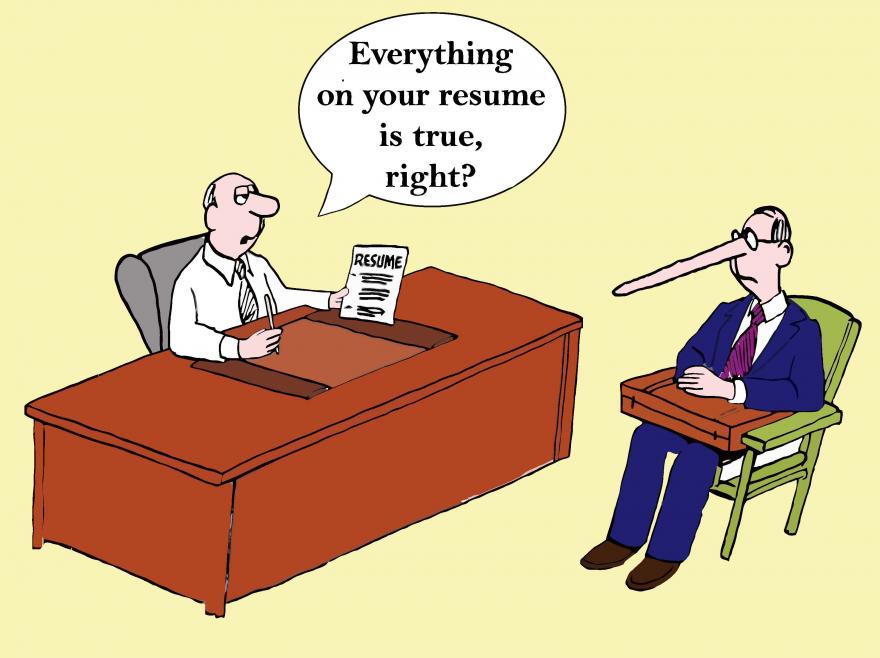When Is It OK to Lie On Your Resume?
 Here’s the thing: we all lie. Whether we invent stories about a fat, bearded man who delivers presents to our children or how much we love watching romantic comedies with our wives, we are all prone to fabricating details that serve a purpose in our lives.
Here’s the thing: we all lie. Whether we invent stories about a fat, bearded man who delivers presents to our children or how much we love watching romantic comedies with our wives, we are all prone to fabricating details that serve a purpose in our lives.
Naturally, these tendencies expand into our professional exploits and we are not immune to embellishing details to get ahead. Of course, there is a big difference between exaggerating certain experiences and flat-out inventing details on your resume. While I would never condone anyone fabricating key elements on their resumes, I think most hiring managers do expect a certain level of creative embellishment. So, what is acceptable and what should you avoid doing?
Stick with the facts
If you graduated university with a 3.2 GPA, you are stuck with this number forever. If you claim to have graduated with a 3.4 GPA on your resume, you can be fairly confident that no hiring manager would forgive such a claim if the truth is discovered (and you should feel confident that this will eventually be discovered). I would strongly advise you against inventing numbers or changing key facts on your resume as these are far too easy to verify and far too hard to explain when you are caught. If you are insecure about certain elements (such as your GPA) on your resume, then feel free to exclude these details. Omitting certain details is a far better approach than being deceitful.
Job title subtleties
This is an area that many people like to embellish on their resumes and all recruiters are fully aware of this practice. Having said that, is there any real harm in doing this? Well, yes and no. If you spent three years working as a Project Coordinator in a fast-paced tech company, is there any harm claiming that you worked as a Project Manager? Most recruiters would not disparage you for doing so. However, if you claimed to have been the Director of Project Management, you are not doing yourself any favours as this lie will be uncovered. Try and use your best judgment when addressing these types of details on your resume.
Be relative
I once (accurately) claimed that I had doubled the size of a company’s workforce during my first 6 months on the job. While this was factually accurate, it is certainly less impressive to discover that the workforce had gone from 2 to 4 employees. While I strongly believe that this feat was no less impressive than doubling the workforce of a much larger company, I am certainly aware how this appears to a recruiter. If you are unsure of how a recruiter will interpret your resume, try and include relative – rather than absolute – numbers to demonstrate progress or success. Yes, this is a little cheeky but I think you should be safe.
Conceal gaps
I do not advocate the notion of trying to hide in plain sight. Many job seekers will simply hope that a recruiter will not notice the large time gap in their resumes and do not make the effort to explain them. If you were out of work for any period greater than, say, 6 months, I would insert an entry into your resume with a list of all the tasks you were performing during this time. Accounting for time away from the workforce is much better than a) lying and b) hoping that no one calls you on it.
Be creative
A friend of mine has been running a home-based daycare for years and has recently started looking for a full-time job in a completely unrelated field: finance. As such, he has had a great deal of trouble aligning his resume with his future goals. Rather than invent details to make his resume more appealing to a finance recruiter, he has approached his resume in a more creative way. While his days were mostly spent feeding and cleaning after young children, there were a lot of elements of running a small business that are very relevant to a job in finance. My advice was to focus less on the daycare elements and to talk more about running a small business, such as performing regular accounting, budgeting and resource management. All jobs have elements in common and sometimes it just needs a creative approach to find the link.
So, ultimately, nothing will sink your career faster than being caught in a lie. However, being caught embellishing certain details may not hurt you in the long run and could certainly benefit you in the short-term. As with most things, use your discretion when choosing to stray from the absolute truth and always be sure that you can back-up any claim you make on your resume.
Originally found on Monster by: Joe Issid
